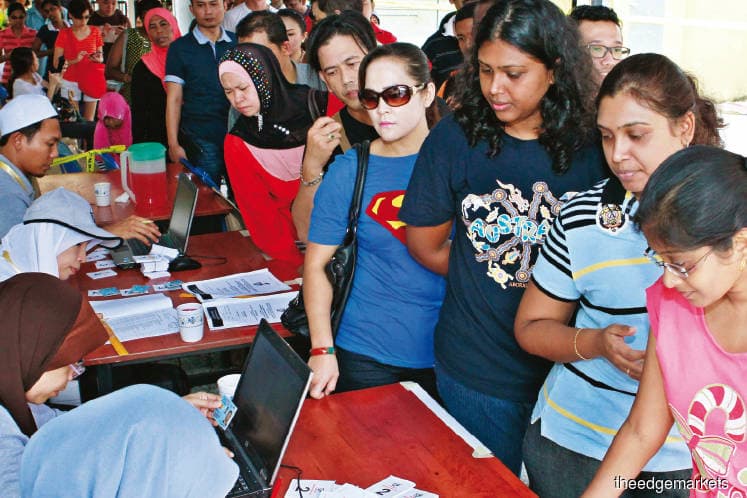
This article first appeared in The Edge Malaysia Weekly on July 8, 2019 - July 14, 2019
IN 1976, the late Tan Sri Syed Jaafar Albar, nicknamed the “Lion of Umno” for his fiery brand of politics, was voted in as Umno Youth chief, or ketua Pemuda Umno, at the age of 62.
With all due respect to the late Syed Jaafar and his family, 62 years is not exactly “muda”. But political circumstances back then forced him to contest the Youth chief’s position at that age, and he won.
If you can remember that episode in the country’s political history, then you are as old as I am, or older.
Perhaps the definition of “youth” had not been spelt out back then, allowing a 62-year-old man to become the Youth chief, apart from the political circumstances mentioned above.
Anyway, the definition of “youth”, as we know it, is a person between the ages of 15 and 40.
But a few days ago, an amendment to the Youth Societies and Youth Development Act was tabled in Parliament by Youth and Sports Minister Syed Saddiq Syed Abdul Rahman. And after five hours of debate by 17 MPs, the amendment was passed.
The Act changed the definition of “youth” by lowering the upper age limit from 40 to 30 and provided for it to be spelt out in the Malaysian Youth Policy.
As I write this, Syed Saddiq has just tabled the amendment to Article 119 of the Federal Constitution to lower the voting age to 18. At present, only Malaysians aged 21 and above are eligible to vote.
The opposition is saying that they are willing to support the amendment if automatic voter registration is also in place. Syed Saddiq says the government agrees with this in principle but that clause is not in the amendment tabled at the current sitting. Election Commission chief Azhar Harun weighed in, clarifying that the government would need to seek another amendment to the Constitution to implement automatic voter registration. He adds that the Elections (Registration of Electors) Regulations 2002 also need to be amended.
Taking all that into account and without trying to pre-empt parliamentary proceedings, chances are that the amendments will be passed.
Academics, analysts and politicians from both sides of the divide seem to favour lowering the voting age, judging from their comments. The pros and cons are clear. A Facebook post by senior Universiti Malaya lecturer Dr Khoo Ying Hooi sums it up nicely: “It is okay to make babies at the age of 18 but not okay to vote? #Undi18”.
Political maturity apparently is not an issue, with many saying that maturity is not determined by age. But there are those who are concerned that 18-year-olds, who would have just completed their secondary education, “can be easily duped by political parties”.
“I understand some concerns that are raised”, says Khoo, and “one is about our current education system that does not have strong civic learning and does not give young people a grounding to prepare them to understand politics.” Also, she says, the country’s previous government did not allow students to take part in politics.
“But now is precisely the time for us to move forward, not just by lowering the voting age but at the same time, strengthening our education system and other related areas,” she adds.
Now, to call a spade a spade. Political parties are set to reap the rewards from lowering the voting age. According to Bridget Welsh, associate professor of political science at John Cabot University in Rome, Pakatan Harapan has the most to lose among all the political parties if this is done. She explains the reasons in her column in Malaysiakini.
As for me, I need to ask whether the move will lead to more populist policies or promises to entice the young. To put it another way, will young voters who lack political maturity be easily influenced by such promises, which can be odd at times?
But according to Khoo, it is not about age. “Well, they (political parties) are already making all sorts of promises to win Malay votes and they also did so for youths.
“Remember the football show promise? It is possible but I do not see that as a major problem,” she says.
The football show she was referring to was a call by some politicians to telecast World Cup matches on free-to-air television — a move seen by many as a bid to woo young voters who are deemed to be ardent fans.
Efforts to woo young and working-class Malays, in particular, are already in motion. The rebranding of Datuk Seri Najib Razak’s image as “Mat Moto” comes to mind. Also, don’t forget that when it was in power, Barisan Nasional pledged to create special circuits for Mat Rempits to indulge in their favourite activity.
And then there is the manifesto. We have seen in previous elections the creation of many manifestos — different ones by the same parties designed for specific audiences. There have even been public declarations for each state on top of national-level manifestos.
We have had special ones for women, youths and specific groups. Manifestos for youths will feature prominently come the next election and could very well be further refined to cater for the young when the voting age is lowered.
But surely to get the votes of the young, political parties will have to field young candidates. Or at least, leaders who can relate and are appealing to young people.
Save by subscribing to us for your print and/or digital copy.
P/S: The Edge is also available on Apple's AppStore and Androids' Google Play.